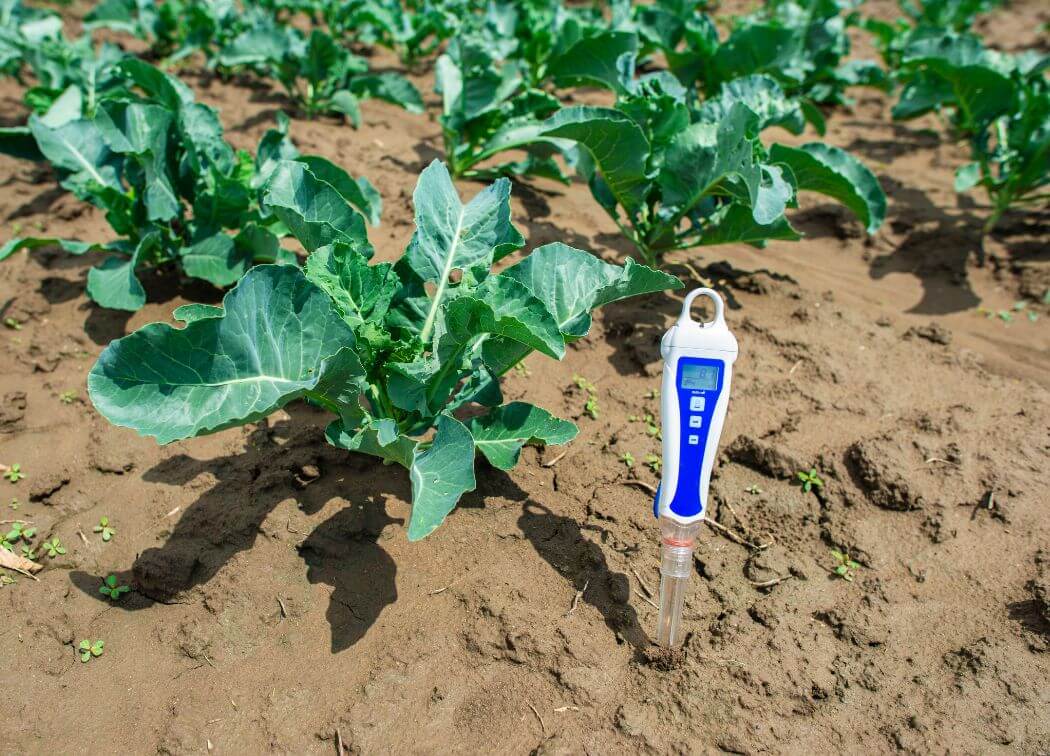You’ve had enough. Your grass has been watered, fertilized, and freed of pests. But it STILL refuses to grow thick and healthy!
In this case, there’s only one culprit left: The garden soil itself.
This is the foundation of ANY lawn and the most vital part of growing. The first word in healthy soil is its pH level. So you’ll need to check that with the best soil test kit!
Your soil’s pH level tells you clearly what nutrients are available, for anything growing in your garden. The ideal soil pH level would fall between 6.0 and 7.0, more specifically 6.5.
Do note that this could change for you, depending on what kind of plants you’re growing. Not all plants prefer the same pH levels!
With that being said, here are the 8 BEST soil test kits to look out for:
- MySoil Soil Kit (Best Overall Soil Testing Kit)
- Garden Tutor Soil Strips Kit (Best Test Strip Kit)
- SSAWcasa Soil Moisture Meter 3-in-1 Soil Kit (Best Budget Option)
- Luster Leaf 1605 Digital Soil Test Kit
- Sonkir Soil pH Meter 3-in-1
- Luster Leaf 1840 Rapitest Soil Test Kit
- Soil Savvy Soil Test Kit
- Luster Leaf 1601 Rapitest Soil Test Kit
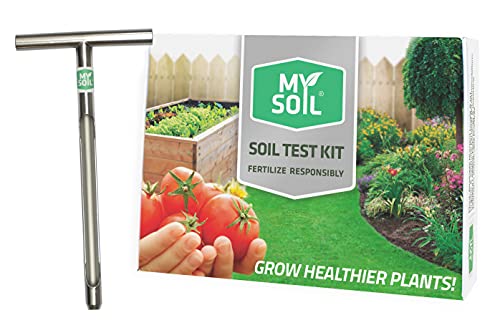
MySoil Soil Test Kit
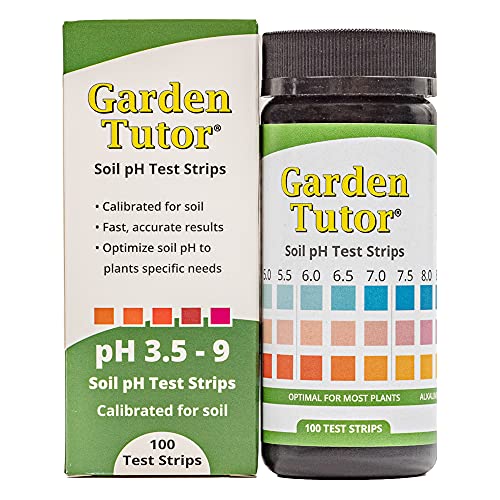
Garden Tutor pH Test Strips

SSAWcasa Soil Moisture Meter
Our Top Soil pH Tester Picks
These are the best soil test kits you can get!
1) MySoil Soil Test Kit (Best Overall Soil Testing Kit)

For our first soil tester, we’ll refer you to the experts. There’s no need to risk faulty probes and faded color charts with the MySoil Soil Test Kit!
All you have to do is mix up the soils in your sample, then return it to the provided storage envelope.
Once it gets back to you, you’ll be able to create the PERFECT growing environment!
Pros
- Professional accuracy
- No risk of faulty readings
- Soil test results come with recommendations for improving your lawn health!
Cons
- Pricy compared to other options
- Results may take over a week to be mailed back
2) Garden Tutor Soil pH Test Strips Kit (Best Test Strip Kit)

Garden tutor’s test strips are the perfect tool for a quick, reliable result!
These strips are extremely handy since they’ll work on indoor and outdoor soil. Plus, these strips come with a manual with the ideal soil pH for loads of different plants!
Be aware of the test strip’s expiration dates! You’re much more likely to get faulty readings if you use an expired test strip.
You should also know that a pH tester will generally offer you a range, not an exact pH level. Garden tutor’s strips are like this.
If you’re looking for a more exact reading, try one of the other soil test kits we’ve recommended here.
Pros
- Wide pH level detection range (3.5 to 9.0!)
- One hundred strips mean less time stressing, more time testing!
- Gives results close to a lab test!
Cons
- pH test strip results can be difficult to read
- Only gives pH readings
3) SSAWcasa Soil Moisture Meter 3-in-1 Soil Test Kit (Best Budget Option)

This boxy fellow is one of the best ph meters around!
As a 3-in-1 soil tester, the soil moisture meter is an incredible, inexpensive option that can do it all!
Be careful with this tester because its sensitivity to readings is matched by its sensitivity to tough ground and pure liquids.
Pros
- Cheap but effective.
- Double prongs ensure accurate readings
Cons
- Slow to give readings
- Probes are not too durable (Avoid sticking this near stones and dry ground!)
- The soil must be watered before it can detect soil moisture
4) Luster Leaf 1605 Digital Soil Test Kit

The Luster leaf 1605 comes with test tubes, and batteries, the “digital” part of this test kit is in the reading, and it’s a chemical soil test kit!
The 1605 comes with a manual that lists the pH preferences of hundreds of different plants, plus recommendations based on your test results.
Remember, DON”T use tap water for this test kit. Use distilled water instead! Water from your tap might affect the readings it gives.
Pros
- Reads the color result for you!
- Tests for pH in soil plus macronutrients (N-P-K)
- Results come up quickly!
Cons
- Pricy for a digital soil test
- The color reader might be confusing
5) Sonkir Soil pH Meter 3-in-1

As an analog soil probe, the Sonkir soil meter does away with batteries and relies purely on your soil to tell you everything you want to know!
This Sonkir analog probe is a great pH tester and soil moisture tester!
Please don’t use it to test pure water or leave it in a pot for too long.
Pros
- 3-in-1 tester does everything at once
- Extremely lightweight
- Gives readings instantly (Despite what the instructions say!)
Cons
- Probes are not too durable
- Won’t detect moisture if the soil is too dry
6) Luster Leaf 1840 Rapitest Soil Test Kit

The Luster leaf 1840 rapitest soil test kit is an analog soil test kit.
This little pH tester has an interesting feature on it. The probe is attached to a cord, making the entire package much more compact and portable! Keep the tip secure since it’s the most sensitive part of the whole kit!
Like its cousin, the 1605 above, the Luster leaf 1840 soil test kit has a manual detailing the watering needs of over 100 plants. Be prepared for your plants!
Pros
- Large, easily readable display (No squinting at your soil!)
- Wide pH detection range (3.5 to 9.0!)
Cons
- Some customers have reported receiving less sensitive units
- The probe is short (4 inches)
7) Soil Savvy Soil Test Kit

If you’re unsure of your soil testing skills, this kit will take the difficulty OUT of your life!
Using the jar, scoop and envelope, you can eliminate the uncertainty of display reading! After mailing your sample, wait for the results to get back to you.
These will come with specific recommendations for your soil’s needs, including ratios for fertilizers!
Just make sure you collect your soil sample properly.
Pros
- Gives results faster than the MySoil kit above!
- Much cheaper than competing lab test kits
Cons
- Doesn’t offer anything more than an extension office would
- Each kit is only good for one soil sample
8) Luster Leaf 1601 Rapitest Soil Test Kit

This is the older cousin of the 1605 earlier, but it’ll still fit your soil testing needs perfectly!
If you trust your own eyes more than the reader’s, this is the BEST soil test kit! The test unit itself has the color chart printed on it. You won’t have any trouble looking back and forth with the 1601.
The marked test vials are easy to read, plus the testing process is simple and fun!
Pros
- Gives results close to lab tests
- Comes with 40 tests (10 each for pH, N, P, and K!)
Cons
- The reagent capsules are difficult to open
What’s So Vital About Soil pH?
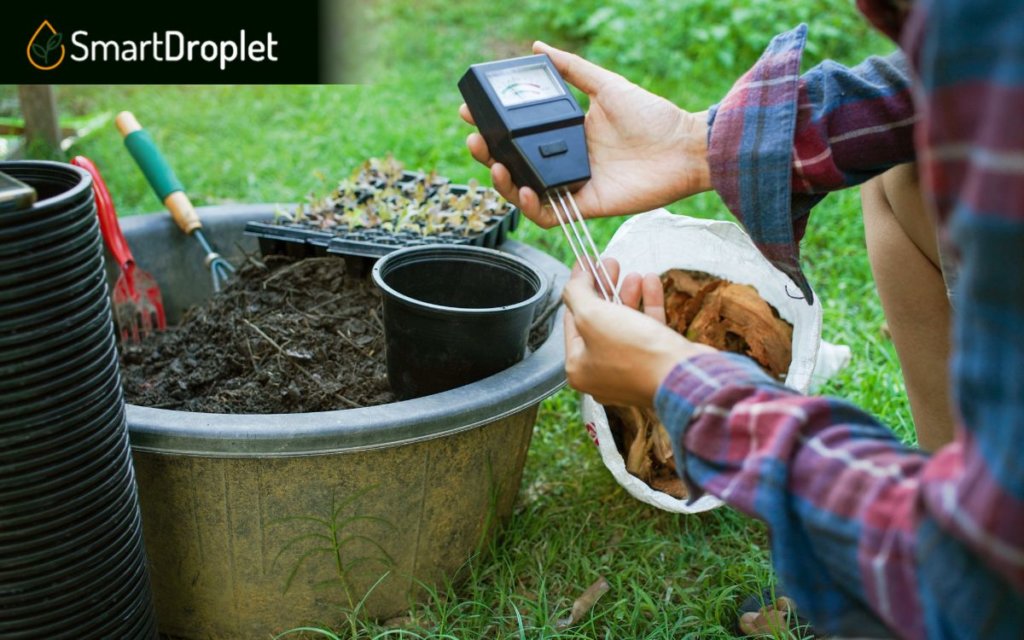
Like a plant’s roots, soil pH spreads and affects everything concerning your lawn when properly nourished.
A beautiful blooming garden starts with achieving the best soil pH from soil structure to soil moisture.
Now, the pH scale runs from 0 to 14, but soil fertility is at its best from 6.0 to 7.0. Most plants would prefer these neutral soil pH levels.
Depending on the kinds of plants you intend to grow, your garden’s ideal pH range will vary.
The best soil test kits will give you an exact reading, but you should also look into your plants’ pH levels.
If your soil has pH levels higher or lower than the prescribed range of 6.0 to 7.0, your soil is referred to as “Sour” and “Sweet,” respectively.
Sour Soil
Also known as acidic soil, a pH level less than 6.0 is just like a strong piece of sour candy, but for your plants, not your mouth!
A little bit of acidity won’t exactly ruin your lawn, but too much will DEFINITELY create sore spots in your grass!
These acidic spots can sprout certain types of weeds, like nettles.
If you see bunches of those familiar friends, it might be time to get your lawn checked. A likely cause of this acidity is heavy rainfall.
Too many storms will wash away elements like phosphorus and potassium, which normally help balance out the acidity.
Sweet Soil
If your soil’s pH levels are greater than 7.0, it counts as “sweet” or alkaline soil.
Alkaline soils block your plants from getting important nutrients like iron and magnesium, which can cause stunted growth.
Iron is something all plants and grasses need to thrive!
Unlike acidic soils, alkalinity is caused by not enough rainfall. Balance is the name of the game for proper soil care.
This issue will cause weeds like chickweed to pop up. Those nasty bunches are your warning sign!
Now that you know the importance of your soil, let’s get into these reviews to find the best soil test kit for you!
What Should You Look For in a Soil PH Meter?
What makes a soil tester ideal depends on what you’ll need it. But there are a few general things that good soil testing kits should have.
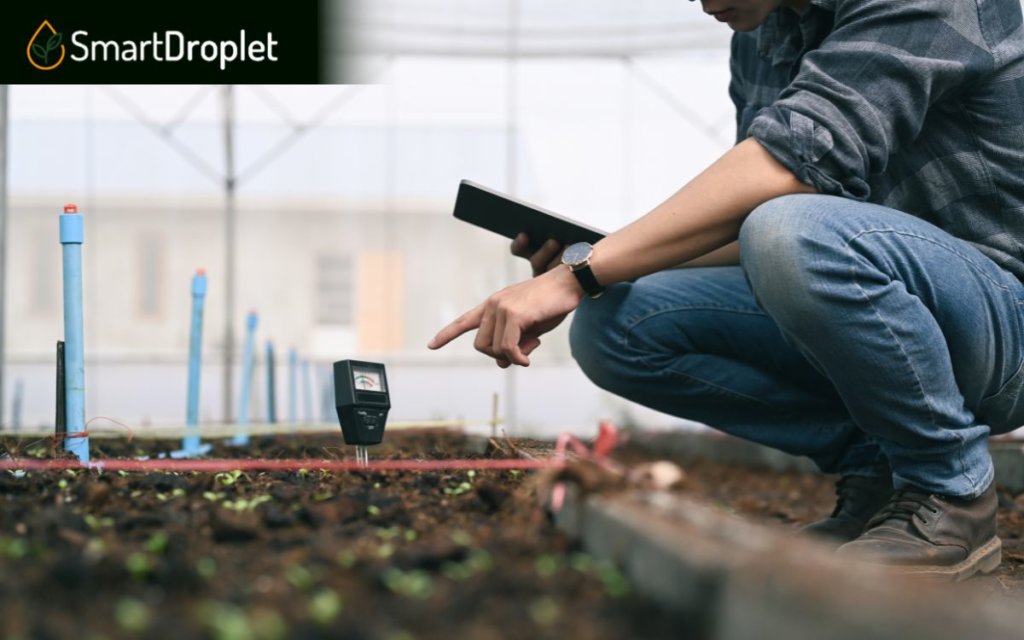
Dimensions and Portability
If you’re growing many potted plants, you don’t need a soil test kit with extremely long probes. Go for something shorter!
However, a short tester shouldn’t be too delicate, either. It should still be tough enough for regular lawn work and repeated testing.
Weather Resistance
Several soil test kits require you to stick them in the ground or mixtures of water and reagents. You DON’T want a test kit that will rust!
Make sure your test kit has waterproof probes, or if it’s a chemical tester, check the test tubes for cracks and holes.
Readability
All test kits come with either a display (for analog and digital testers) or a color chart (for chemical soil test kits.)
Ensure that your chosen kit has clear markings or a properly-printed color chart.
You don’t want your readings to be affected by a poor display!
If you opt for a lab test kit, the results should be marked and explained when they are mailed back to you.
Toughness
Both Analog and Digital soil testers need to be able to withstand lots of repeated testing. This means you should look for one with well-built probes.
With flimsy probes, your soil tester risks being damaged by whatever else is in your soil, like moisture.
Flexibility
The pH level of your soil might be the first word in lawn health, but it’s certainly not the last!
Can your soil tester do everything that you need it for? If it’s a 3-in-1, how many of those things does it do well?
You need to do several tests to get the best idea of your soil’s health. Apart from pH level, you should also check moisture and sunlight levels.
A 3-in-1 test kit lets you do all these tests with just one device.
Your soil’s moisture levels are your warning seriously stop (or stop overwatering) your garden. Neither flooded soil nor overly dry soil makes for a good growing environment.
Sunlight levels are also essential so that your garden can grow as lush as it can. Too much shade in specific areas will seriously stop proper growing.

Different Kinds of Soil pH Testers:
Here’s a rundown of the different kits you can use for testing soil and how to use them!
Digital Soil Testers
These test kits can be a little delicate in their readings. For the most accurate results, you’ll have to clean them thoroughly and make sure their batteries are charged.
Some digital soil testers are particular with their probe’s cleanliness. You’ll risk getting a bad reading if you don’t clean these kits properly!
Before and after using these kinds of test kits, disinfect their probes with alcohol or wash them with soap and water.
Remember that digital kits are often designed just for pH level checking. If you want to know soil nutrient levels, you’ll need a chemical test kit.
Analog Soil Testers
An analog soil test is great if you’re just looking for a quick soil test. These kits rely on a natural electrical charge between their probes and the ground for their readings.
As a result, these are battery-free devices, but they also give more general readings than digital testers.
With an analog tester, we advise doing multiple tests in different areas. This is to get a better picture of your soil’s ph level. Just make sure to also clean the probes before and after each test!
A single soil patch’s test results won’t exactly give a complete reading of your yard’s health.
Chemical Soil Testers
If you’ve ever played with a starter chemistry kit, you’ll understand the idea behind chemical soil testers. It’s the same, but less for play and more for lawn health!
Most chemical soil testers are simple enough to use. You’ll usually need both the provided test tube and distilled water.
Collect a soil sample from your yard, and place it in the test tube. Mix it with some water and a capsule.
The capsule’s color should match the vial or test tube’s. Shake the slurry, and follow the instructions before consulting the color chart.
Laboratory Test
Sending a soil sample for a lab test will give you the most accurate results you could hope for. These experts and their equipment will help you set your soil straight!
Your soil testing kit should come with directions on how to collect and dry out the sample for testing and a special package for storing and mailing back the soil samples.
Make sure that you collect your soil sample properly for the laboratory test, and be aware that this is by far the slowest of all testing methods.
It could take up to weeks for your sample results to be mailed back!
The accuracy is worth the time, but if you want faster (but less specific) results, try another one of the test kits from this list!
Lab soil test kits will give you a complete breakdown of what’s under your feet, including nutrients and other organic material present.
You’re still in luck if you want a lab test but can’t order one!
Try asking around at your local college extension offices to see if they offer soil testing services.
They usually will and for a completely reasonable fee. Just know that your local extension office won’t always have a special package for returning your samples.
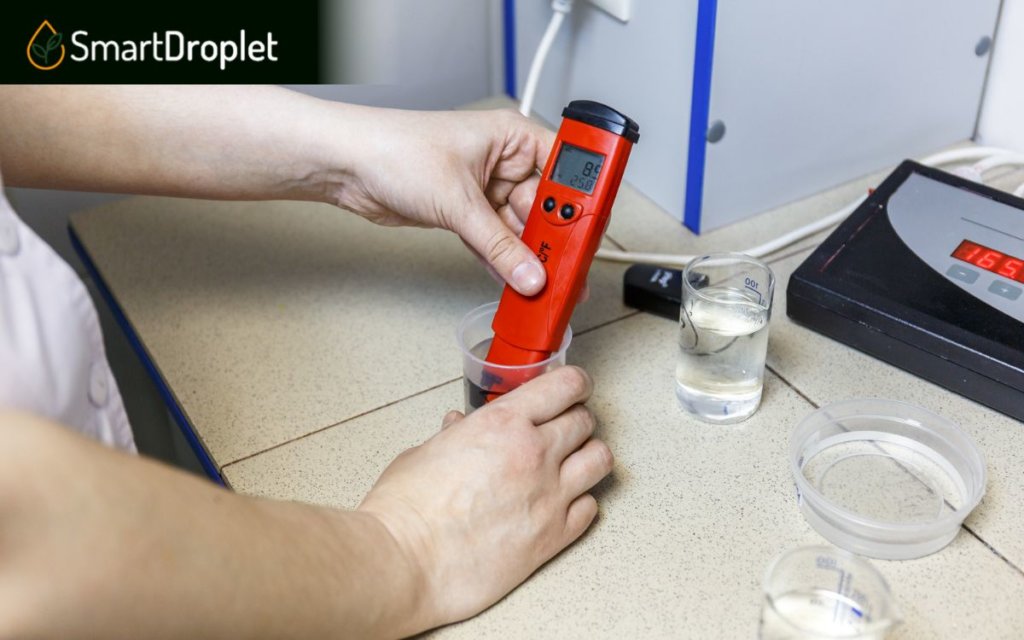
The Basics Of Soil pH Level Testing
Here’s how to go and test your soil!
Testing For Soil pH Kit-Free
You don’t need to test your soil with a kit…as long as you don’t mind this rough method!
No kit? No problem! This method can be done without any specialized equipment!
First, get 2 clean containers. Then get a few soil samples from the areas you intend to plant in. You’ll blend them all, so get a few spoonfuls from each patch. Make sure you get enough for each container!
Now you’ll need some distilled water, baking soda, and vinegar.
Add half a cup of vinegar to one cup, and look closely. If you see bubbling or hear a fizzing, sizzling sound, you’ve got sweet, alkalinic soil.
Take half a cup of your distilled water, add it to the other container, and then mix the baking soda in. If you get fizzing and bubbles here, your soil is sour or acidic.
No response of either bubbling or fizzing in either test means you have neutral soil. Congratulations!
This is a good baseline you can improve on later with a proper testing kit!
Probing for Your Soil pH
We hope you don’t have any freshly laid sod because you’ll need to dig lots of small holes around your backyard for this test!
First, dig a small hole and fill it with distilled, boiled water. Make sure the hole is about two inches deep.
Leave your clean probe inside for one minute to get to know your soil. Then, get your reading.
A reading of seven is good, neutral soil. Anything lower is acidic, and anything higher is basic.
Now, your soil might change depending on where you are in the yard, so repeat this test in different areas.
Soil pH Through Color-Matching
For this test, you’ll be using specialized pH test strips.
Get some distilled, clean water and a few tablespoons of soil. Mix them in a clean container. Dip the test strip inside the mix for roughly half a minute.
Take it out and clear any dirt from the testing strip, then compare the color you have to the color chart provided with the kit. Match the testing strip’s color to the chart.
If you want to test pH levels with students or your children, this method is a great way for them to help out!
What Can I Do if My Soil pH Level Is Too High?
Tame your basic soil with these amendments!
Peat Moss
This organic matter is ideal for any garden, whether you’re packing indoor pots or an untouched plot of land. Just mind its price if you have a larger growing area!
Fertilizer
Pick a soil amendment with urea or ammonia nitrate to acidify your soil. But be sure to check the label, so you don’t flip your soil into acidity!
What if My Soil pH Level Is Too Low?
Stop your soil’s acidity with these!
Lime
This soil amendment’s sure to get your hands dirty. Because of how you have to apply it!
You can sprinkle this onto just the top layer of your soil, but you’ll have to mix it in manually for the best results.
Potash
Unlike lime, this mineral will be fine when applied to your topsoil. Sprinkle it and let irrigation do the rest of the work for you!
Keep in mind that Potash is quite potent, so it works fast!
Final Thoughts
Your soil’s pH level is the most important part of your lawn since it directly decides what you can grow. So to get the best idea of your lawn health, we recommend the MySoil Soil Test Kit!
Take the hassle out of guessing what you’re missing, and follow the lab’s recommendations for the best results!
As a general rule of thumb, collect your soil samples for about an entire season before you intend to plant. So if you’re planning a summer bloom, get testing around spring green-up.
If your soil tests give unbalanced results, it’ll take about that much time to fix your yard’s pH levels.
It’s best to test soil pH every 2 to 3 years and keep a regular schedule. Follow the seasons strictly whenever you’re testing soil. We recommend doing any tests during the fall!
With this handy guide, you’re guaranteed to find the best soil pH tester for your needs!
Frequently Asked Questions
Have trouble understanding the topic at hand? Here are some of the most frequently asked questions about the subject! We hope it will clear some misunderstandings and concerns!
What Kinds of Soil Tests Should I Run?
Any testing kits you get should at least be able to detect Macronutrients!
Macronutrient Testing
These are specifically the big 3 elements found in almost all fertilizers. So that’s Nitrogen, Phosphorus, and Potassium.
Your plants won’t always be satisfied with just the big 3. Sometimes they’ll require trace amounts of different minerals.
Micronutrient Testing
Most soil pH testing often only checks your soil’s pH levels and N-P-K levels, but they’re not the only magic your lawn needs.
Ideally, your soil sample should have micronutrients like Iron, Calcium, Copper, Zinc and Sulfur. If you get a more advanced soil tester, it should be able to detect these smaller minerals.
What Are the Different Kinds of Soils?
When you test your soil, it should fall into one of these categories.
Clay Soil
This is one of the better types of soil but has its own issues. Clay soil is rich in nutrients, but its thickness prevents plants from putting down roots easily.
This soil is very sticky when wet and extremely dry in the heat. Clay needs aeration!
Silty Soil
Silt is the finest type of soil. Most garden plants will grow quite well in silty soil, but it might also require fertilizer for more nutrients.
Sandy Soil
Sandy soil has the best drainage of all soils, but this also means it can’t keep moisture and other soils.
On the flip side, roots have plenty of space to grow in sandy soil. It just needs additional moisture for growth.
Loamy Soil
Loam, or black soil, is the best kind of soil around. It’s got the best parts of all three previous soils and none of the downsides.
So it’s nutrient-rich, an ideal environment for putting down roots, and has good drainage while also retaining enough moisture for growth. Plus, it doesn’t become too tough when it dries out!


